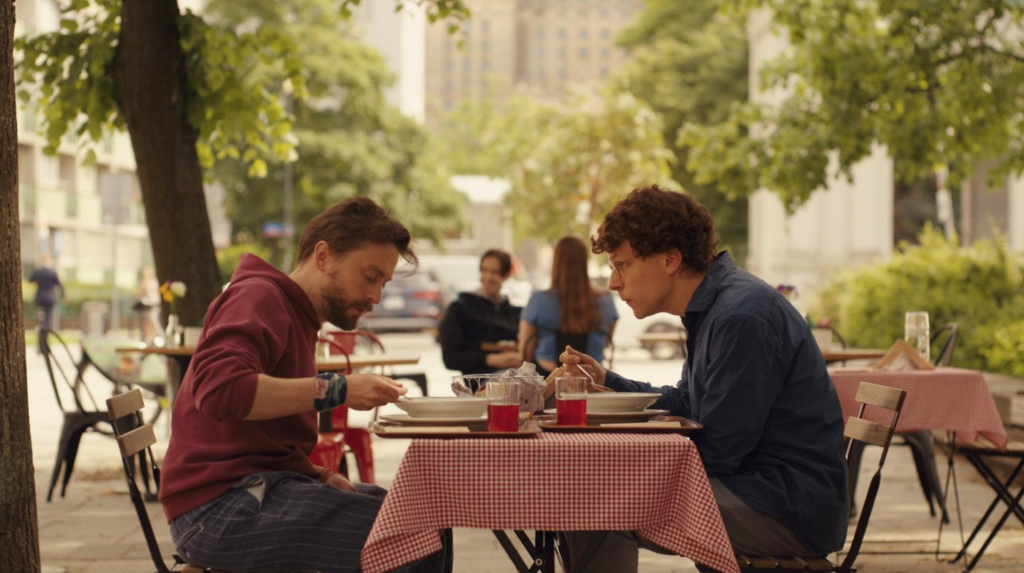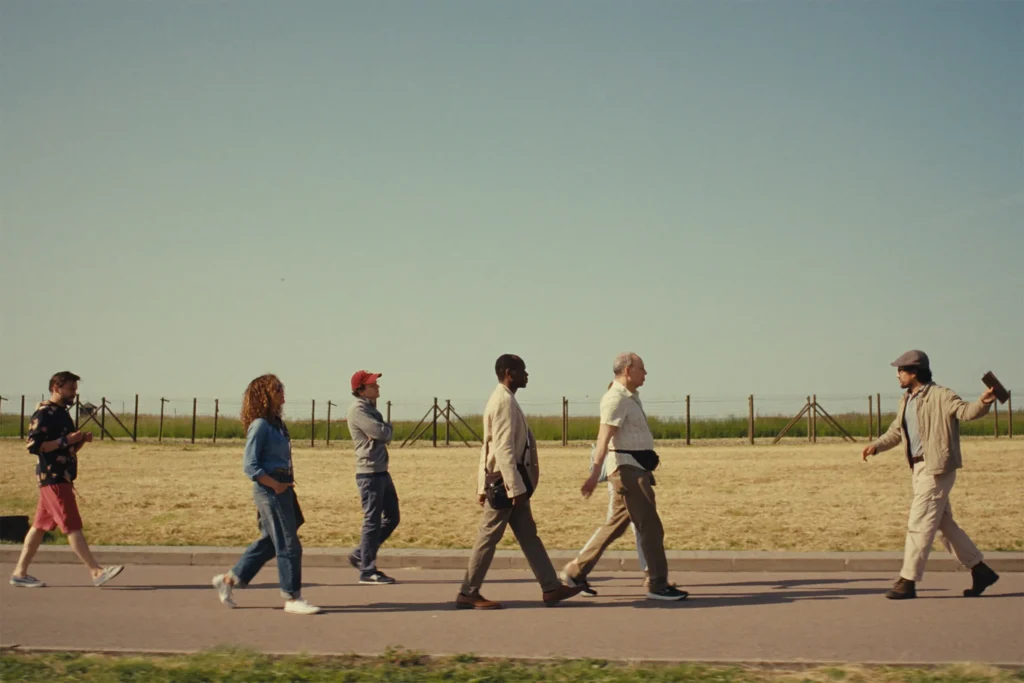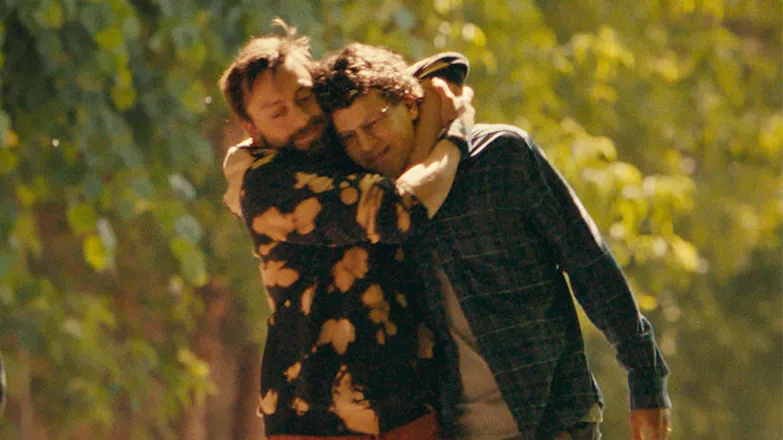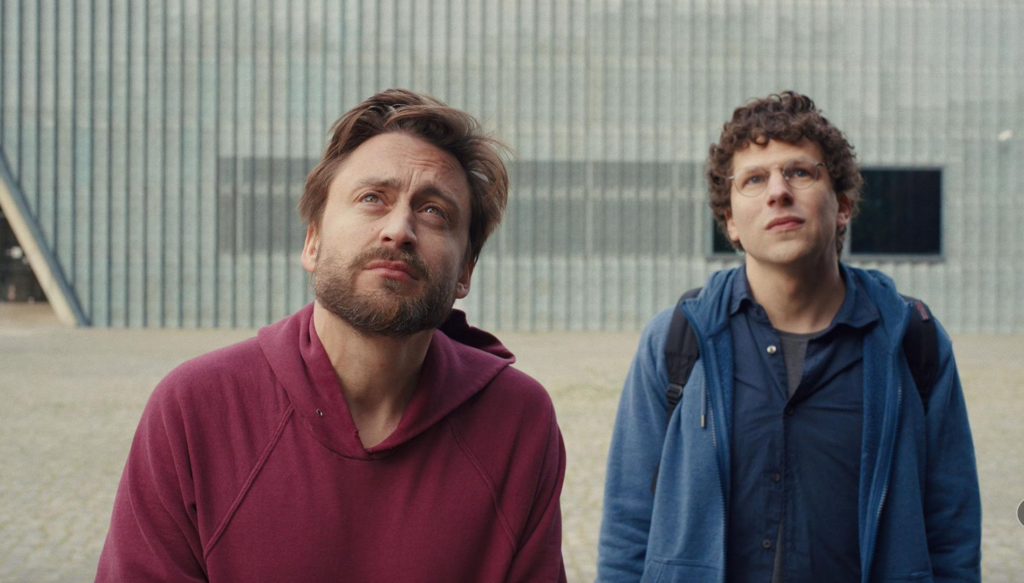A Real Pain (2024). Written and Directed by Jesse Eisenberg. Starring Jesse Eisenberg and Kieran Culkin.
A Real Pain is Jesse Eisenberg’s third film as writer and director, and his second also starring in a film. The film follows two cousins in their late 30s, David Kaplan (Eisenberg) and Benji Kaplan (Culkin) as they join a small tour group travelling around Poland. The tour focuses on World War II and atrocities experienced by the Jewish people during WWII, and also serves as a pilgrimage to honour their late grandmother, whose old house they plan to visit at the end the trip.
We are shown early in the film that the two cousins are very different people. For example, Benji has a joyful conversation with the TSA agent at the airport security gates, whilst David remains quiet and paranoid that is cousin will get caught with the weed he mentions he is bringing. This perfectly frames up what we will expect to see from these characters as they go on their journey, the quiet introvert (David) being pulled through the narrative by our protagonist (Benji) who is often diverting from the original trip meticulously planned by David.

As we follow the cousins on their journey, we are introduced to the several other tour members with various Jewish backgrounds, as well as a tour guide taking them on their journey. The group visits various historically significant landmarks, including the Warsaw Uprising Monument, a statue depicting the strong and brave Jewish soldiers who fought unsuccessfully to save Warsaw from its Nazi occupation, and Majdanek, a Nazi concentration camp where so many lost their lives.
It is during these scenes that we see the extreme emotions of Benji, who in one scene excitedly entices the rest of the group to join him to pose dramatically for a photo (juxtaposed to David taking photos from everyone’s phones), whilst in another scene will feel the deepest of sorrow and pain for what the Jewish people went through and will criticise anyone else who doesn’t feel it to the extreme that he does (leaving David to apologise on behalf of Benji and his actions on several occasions).

Between the tour group locations, we are presented with beautiful depictions of Poland’s offerings. From parklands, to restaurants and bustling city locations, Cinematographer and Warsaw born Michal Dymek delivers beautifully shot locations, showing us many amazing parts of Poland that are often overlooked to accommodate the countries’ history and atrocities.
From slow panning wide shots showing Poland’s picturesque landscapes, to intimate locations within close quartered rooms dripping with culture and history, it is clear both Eisenberg and Dymek both wanted to represent all that their culture and the country of Poland has to offer, with incredible results left on the screen.

We are shown the full beauty of Poland’s landscapes at times, and made to feel as though we are part of the tour group during intimate or intense discussions at other times. The music and overall soundscape accompanies these visuals perfectly. Slow, deliberate piano scores are played as we are shown parts of Poland’s landscape, whilst at other times there is complete silence, allowing the audience to truly absorb what is being presented to us on the screen.
The snappy dialogue between Benji and David is always entertaining and is performed effortlessly by Eisenberg and Culkin who give brilliant performances, however Culkin clearly shines comparatively in with Eisenberg giving us a character and performance we’ve seen from him before.
Whilst Eisenberg’s David is much what we come to expect from a Jesse Eisenberg character, it is a role he plays well. His performance of the quiet introvert, often nervous and awkward in social settings that needs to be pushed through the narrative by a strong protagonist is textbook, and reminiscent of previous characters he has played in Zombieland, Social Network, and others.
He delivers a strong performance playing the straight man to Benji’s extremities, but there is nothing new from Eisenberg’s acting arsenal as far as performance goes. Eisenberg may have been more focused on his direction of Culkin and the film as a whole, as what is clear is that A Real Pain is Eisenberg’s love letter to his Jewish heritage and Poland’s history whilst also showing us the beauty that lies within both.

As our main protagonist of the film, Culkin as Benji is fantastic. Benji is constantly taking the narrative in a random direction, and pushes those around him to really feel and experience what is happening around them. We see Benji’s emotional highs and lows associated with the decisions made and the places they visit. We can see in Culkin’s performance that Benji is struggling with what life has to offer, and the life he is experiencing, and his struggle with the recent death of their grandmother.
The overall arc of the story and the characters within it is promising. In a story such as this one, we have a clear protagonist (Benji) who pushes those around him to improve themselves and take a new perspective or lease on life. In complete contrast to Benji, we have David who clearly lives life with the opposite mantra to Benji, leading a safe, medicated, happily married life with a family.
Each surrounding character on the tour has an individual experience with Benji, all of which are genuinely positive experiences for each of them, with the expectation that the experience will have helped them grow as people. We also see signs that our main characters could better somehow by having gone on this trip and pilgrimage. Sadly, we do not find out what the impacts of the journey had on any of our characters.
Overall, A Real Pain is a story with well written dialogue, that is beautifully shot with amazing performances, however we are left with an unfulfilling ending.
7 stars out of 10

